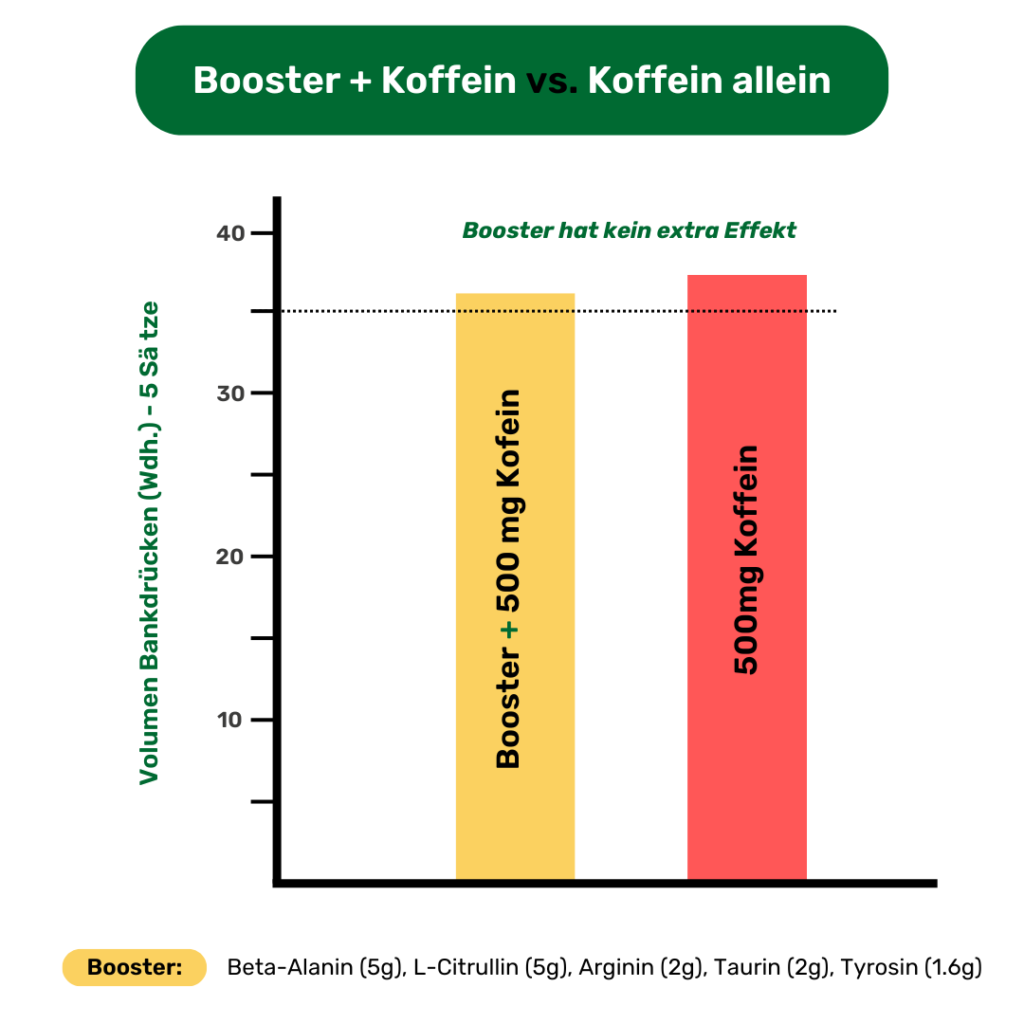Caffeine vs. Booster + Caffeine
This study (1) investigated whether pre-workout boosters have an extra effect on strength performance when a high dose of caffeine was consumed at the same time?
The Supplement Protocol
As a base, 6mg of caffeine per kg of body weight was chosen. For an average body weight of 84kg, this corresponds to an absolute dose of about 500mg. This is the equivalent of about 5 coffees, so a relatively high dose, but corresponds to current recommendations of caffeine in strength training (2).
Ingredients pre-workout booster:
- Beta-Alanine: 5g
- L-Citrulline: 5g
- Arginine: 2g
- L-Taurine: 2g
- L-Tyrosine: 1.6g
- Caffeine: 300mg + 200mg extra added> equal amount of caffeine as the caffeine group
The Performance Test
For this purpose, 15 well-trained strength athletes completed 5 sets of bench press, with the first set corresponding to the 10RM and the weight being increased by
+ 2.5kg in each of the subsequent sets. The subjects were to complete as many repetitions as possible in each set. All athletes completed the test workout twice, not knowing when they had only taken the caffeine and when caffeine + pre-workout booster (cross-over study design).
The Result
Overall, the subjects in the “caffeine group” were able to complete 36.85 repetitions in the 5 sets of bench press. The “caffeine+booster group” completed an average of 35.85 repetitions – one repetition less. The difference is declared statistically significant, which more or less means that the observed effect did not simply occur by chance. The authors of the study focus their interpretation on a possible benefit of caffeine alone: They interpret the results to mean that 500mg of caffeine is more effective than 500mg of caffeine + extra pre-workout booster. You can read how we interpret the whole thing below in the conclusion.

Our Interpretation
We find it definitely exciting that no additional benefit of the pre-workout booster was found. Because some of the ingredients, such as beta-alanine (
For L-citrulline, 8-12g is considered the optimal dose (5). The 5g used is more than is often used in other boosters, but is still below the optimal dosage. Accordingly, it would not be surprising if the dose used had no performance-enhancing effect.
For beta-alanine, it has long been known that a loading phase of 4-6 weeks is necessary to significantly increase intramuscular carnosine levels (6). Carnosine is ultimately the substance that is supposed to lead to an increase in performance during anaerobic exercise. Single intake, as used in this study, is known to have no performance-enhancing effect (7).
In addition, it is not unlikely that the chosen strength test has too little volume for the ingredients to really have their optimal effect.
However, we do not agree with the authors’ interpretation that caffeine alone is more effective than the same dose of caffeine + pre-workout booster. The difference of one repetition is simply too small to really draw conclusions. And physiologically, it simply makes no sense. The booster may not cause an additional performance boost, but there is no plausible explanation why it should reduce performance – and that would be the only sensible explanation for the authors’ conclusion.
Unfortunately, the study does not answer the question of whether pre-workout boosters are generally useful or not. Because: there is no control group in the study that only took a placebo. And of course, not every pre-workout booster is structured the same, in terms of ingredients and dosage.
Sources:
- Kruszewski, M., Merchelski, M., Kruszewski, A., Tabęcki, R., Aksenov, M. O., & Pągowski, Ł. (2022). Effects of multi-ingredient pre-workout supplement and caffeine on bench press performance: a single-blind cross-over study. Nutrients, 14(9), 1750.
- Guest, N. S., VanDusseldorp, T. A., Nelson, M. T., Grgic, J., Schoenfeld, B. J., Jenkins, N. D., … & Campbell, B. I. (2021). International society of sports nutrition position stand: caffeine and exercise performance. Journal of the International Society of Sports Nutrition, 18(1), 1.
- Maté-Muñoz, J. L., Lougedo, J. H., Garnacho-Castaño, M. V., Veiga-Herreros, P., Lozano-Estevan, M. D. C., García-Fernández, P., … & Domínguez, R. (2018). Effects of β-alanine supplementation during a 5-week strength training program: a randomized, controlled study. Journal of the International Society of Sports Nutrition, 15, 1-12.
- Glenn, J. M., Gray, M., Wethington, L. N., Stone, M. S., Stewart, R. W., & Moyen, N. E. (2017). Acute citrulline malate supplementation improves upper-and lower-body submaximal weightlifting exercise performance in resistance-trained females. European journal of nutrition, 56, 775-784.
- Suzuki, T., Morita, M., Hayashi, T., & Kamimura, A. (2017). The effects on plasma L-arginine levels of combined oral L-citrulline and L-arginine supplementation in healthy males. Bioscience, biotechnology, and biochemistry, 81(2), 372-375.

